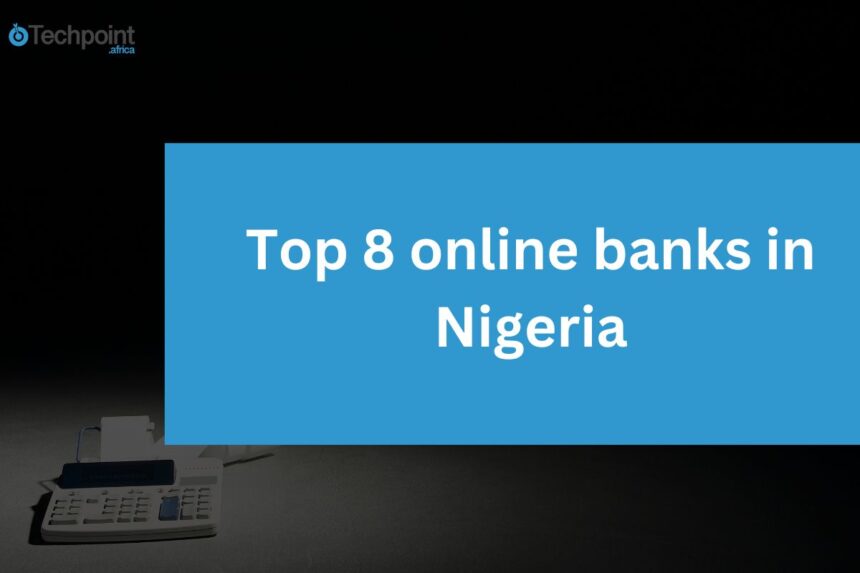Key features:
- High-yield savings: V Bank offers competitive interest rates for savings accounts.
- Financial planning tools: Users can set financial goals, track expenses, and create budgets within the app.
- Personal loans: V Bank provides quick and easy access to personal loans with flexible repayment options.
- Business accounts: V Bank caters to businesses with dedicated accounts and financial solutions.
Pros: V Bank is known for its high-interest savings accounts and robust financial planning tools.
Cons: Some users may find the interface slightly less intuitive compared to other digital banks.
Ideal for: Individuals looking for high-interest savings accounts and comprehensive financial planning tools.
5. Moniepoint: “The future of finance.”

Moniepoint is a digital bank focused on providing financial services to underbanked populations in Nigeria. Through its mobile app, Moniepoint offers services such as bill payments, airtime top-up, and fund transfers.
Key features:
- Agent banking: Moniepoint has a network of agents across Nigeria to facilitate cash deposits and withdrawals.
- Instant transfers: Users can transfer funds instantly to any bank account in Nigeria.
- Bill payments: Pay bills for utilities, cable TV, and more directly from the app.
- Customer support: Moniepoint offers reliable customer support to assist users with any issues or questions.
Pros: Moniepoint’s agent banking network makes it convenient for users to access banking services in remote areas.
Cons: The app interface may require some time to get used to for new users.
Ideal for: Individuals in underserved communities looking for accessible and convenient banking services.
6. PalmPay: “Banking made easy.”


PalmPay is a mobile money app that offers financial services such as bill payments, airtime top-up, and fund transfers. With its user-friendly interface and convenient features, PalmPay aims to simplify banking for its users.
Key features:
- Instant transfers: Send money instantly to other PalmPay users or any bank account in Nigeria.
- Bill payments: Pay bills for utilities, internet, and more directly from the app.
- Cashback rewards: Earn cashback rewards for transactions made on the app.
- Referral bonuses: Get bonuses for referring friends to join PalmPay.
Pros: PalmPay offers a simple and intuitive app interface for easy navigation.
Cons: Some users may find the range of services limited compared to other digital banks.
Ideal for: Individuals looking for a straightforward and user-friendly mobile money app.
7. Paga: “Simple & secure payments.”


Paga is a mobile payment platform that allows users to send and receive money, pay bills, and make purchases from their mobile devices. With its focus on simplicity and security, Paga has become a popular choice for digital payments in Nigeria.
Key features:
- Mobile payments: Send money to friends and family or pay bills using the Paga app.
- Merchant payments: Make purchases at partner merchants using the Paga platform.
- Secure transactions: Paga prioritizes user security and data protection for all transactions.
- Customer support: Paga offers reliable customer support to assist users with any payment-related issues.
Pros: Paga’s simple and secure platform makes it easy for users to make mobile payments and transfers.
Cons: Some users may find the range of services limited compared to full-service digital banks.
Ideal for: Individuals looking for a reliable and secure mobile payment platform in Nigeria.
8. PocketApp by PiggyVest: “Save, earn and invest.”


PocketApp by PiggyVest is a digital savings and investment platform that helps users save, earn interest, and invest in various financial instruments. With its focus on financial literacy and goal-based savings, PocketApp is a popular choice for individuals looking to grow their wealth.
Key features:
- Automated savings: Set up automatic savings plans to reach your financial goals.
- High-yield savings: Earn competitive interest rates on your savings with PocketApp.
- Investment opportunities: Invest in mutual funds, stocks, and other financial instruments through the app.
- Financial education: PocketApp provides financial literacy resources to help users make informed financial decisions.
Pros: PocketApp’s focus on financial education and goal-based savings makes it a valuable tool for individuals looking to improve their financial habits.
Cons: Some users may find the investment options limited compared to dedicated investment platforms.
Ideal for: Individuals looking to save, invest, and grow their wealth with a user-friendly app.
Conclusion
With the rise of digital banking in Nigeria, individuals and businesses now have access to a wide range of financial services at their fingertips. Whether you’re looking for fee-free banking, high-yield savings, or convenient payment options, there’s a digital bank in Nigeria that can meet your needs.
By choosing the right online bank for your financial goals and preferences, you can take control of your finances and enjoy a seamless banking experience. Explore the top online banks in Nigeria mentioned in this article and discover the benefits of digital banking today.
What are the benefits of using an online bank in Nigeria?
Using an online bank in Nigeria offers convenience, accessibility, and often lower fees compared to traditional banks. It also allows for easy money transfers, bill payments, and saving options without the need to visit a physical branch.
4. Can I trust the security of online banking in Nigeria?
While online banking in Nigeria is generally safe, it is important to choose a reputable bank with strong security measures in place. Always ensure that the bank is licensed and regulated by the appropriate authorities to protect your financial information.
5. How can I open an account with an online bank in Nigeria?
Opening an account with an online bank in Nigeria is typically a simple process that can be done through the bank’s website or mobile app. You will need to provide personal information and verify your identity before your account is activated.
Overall, online banking in Nigeria offers a convenient and secure way to manage your finances. With a wide range of options available, you can choose the best online bank that meets your specific needs and preferences. Whether you are looking for high-yield savings accounts, business-focused services, or user-friendly digital wallets, there is a digital bank in Nigeria that can cater to your financial needs. Take the time to explore the different options and find the online bank that is right for you. Online banks in Nigeria have made it easier for individuals to access loans with flexible repayment terms. Banks such as Kuda, PalmPay, and ALAT by Wema are leading the way in providing convenient and efficient loan services to their customers.
One of the advantages of accessing loans through online banks in Nigeria is the ease and convenience of the process. With just a few clicks on your mobile device or computer, you can apply for a loan and receive approval within a short period of time. This eliminates the need to visit a physical bank branch and wait in long queues to apply for a loan.
Furthermore, online banks in Nigeria offer competitive interest rates and flexible repayment terms, making it easier for borrowers to manage their finances. Whether you need a short-term loan to cover unexpected expenses or a long-term loan for a major purchase, online banks have a variety of loan products to suit your needs.
In addition to loans, online banks in Nigeria also offer a range of other financial services, such as savings accounts, investment opportunities, and bill payment services. This makes it convenient for customers to manage all their financial needs in one place, without the hassle of dealing with multiple institutions.
Overall, the rise of online banks in Nigeria has revolutionized the way people access financial services. With their user-friendly interfaces, fast transactions, and innovative offerings, online banks like Kuda, ALAT by Wema, and others are changing the way Nigerians bank. Whether you’re looking for a quick loan, high-interest savings account, or business-friendly solutions, there’s an online bank in Nigeria that can meet your needs. The world of technology is constantly evolving, with new advancements being made every day. From artificial intelligence to virtual reality, the possibilities seem endless. One of the most exciting developments in recent years has been the rise of 5G technology.
5G, or fifth-generation technology, is the next generation of mobile connectivity. It promises faster speeds, lower latency, and more reliable connections than ever before. With 5G, users will be able to download movies in seconds, stream high-definition videos without buffering, and connect multiple devices simultaneously.
But what exactly is 5G, and how does it work? In simple terms, 5G is a network of cells that communicate with each other to provide wireless connectivity. These cells are made up of small antennas called small cells, which are placed in various locations to provide coverage. These small cells are connected to a central hub, which in turn is connected to the internet.
One of the key features of 5G technology is its ability to use higher frequency bands than previous generations. This allows for faster data speeds and lower latency, making it ideal for applications that require real-time data transmission, such as autonomous vehicles and remote surgery.
Another important aspect of 5G technology is its ability to support massive connectivity. With the Internet of Things (IoT) becoming more prevalent, there is a growing need for networks that can support a large number of connected devices. 5G technology is designed to handle this demand, with the ability to connect up to 1 million devices per square kilometer.
The benefits of 5G technology are vast, with implications for a wide range of industries. In healthcare, 5G can enable remote monitoring and diagnosis, allowing patients to receive care from anywhere in the world. In manufacturing, 5G can improve efficiency and productivity by enabling real-time monitoring of production processes. In transportation, 5G can enable autonomous vehicles to communicate with each other and with infrastructure, making roads safer and reducing traffic congestion.
While the potential of 5G technology is immense, there are still challenges that need to be addressed. One of the main concerns is the rollout of 5G infrastructure, which requires significant investment and coordination between multiple stakeholders. There are also concerns about the security and privacy implications of 5G technology, as the increased connectivity could potentially lead to more vulnerabilities.
Despite these challenges, the future of 5G technology looks promising. With its faster speeds, lower latency, and massive connectivity, 5G has the potential to revolutionize the way we live and work. As the technology continues to evolve, we can expect to see even more exciting advancements in the years to come.







